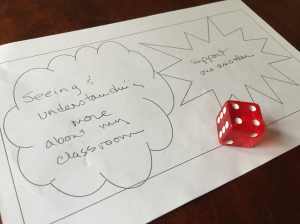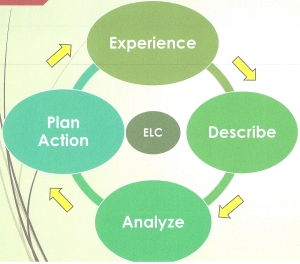“We do not learn from experience. We learn from reflecting on experience.” John Dewey
Our first “Reflective Practice Group” meeting was quite successful! We were a group of 16 teachers, coming from San Francisco, the “East Bay” and the “North Bay.” We met in a classroom at the Canal Alliance, where many of us teach. There were teachers with decades of experience, and some brand new teachers. Our 2-hour session began with a get-acquainted mingle about what reflective practice means to each of us, and what motivated us to attend the first RPG meeting.
About a third of the attendees had some previous experience with the Experiential Learning Cycle (ELC), so we had a brief intro/review of the ELC, focusing on the idea that it is both a description of the learning process, and a framework for reflecting on our experiences. For this introductory session, I didn’t distinguish between Interpretations and Generalizations, conflating them together in Analysis.
A shared learning experience
Then we had a shared experience (I taught a mini-lesson on the Korean numbers 1-to-6 and the Korean words for “yes” and “no.”) After the mini-lesson, everyone reflected on just one step of the lesson that stood out for them, looking at their experiences as learners in the lesson, using the ELC framework, first to describe what happened and how they felt, and then to analyze the experience and come up with multiple ideas about what helped and hindered their learning during that part of the Korean lesson. At each step of the ELC, we shared our reflections with partners and the entire group.
Lots of interesting discoveries
Almost every teacher had several “interpretations” about the slice of the lesson they analyzed. For example, teachers mentioned:
- – sometimes what helped one person learn was exactly what hindered someone else’s learning
- – the effectiveness of minimal teacher-talk
- – the effectiveness of group work
- – the value of students’ knowing what the learning objective is
- – the importance of providing written as well as spoken information
- – seeing things from the students’ perspective
- – the possibility of getting students to also reflect on the lesson
And there were other rich topics of discussion, all emanating from the reflection on our experiences as learners.
Changing Hats:
In the last step of the reflective cycle, each person made action plans for themselves as teachers, based on their reflection about the lesson. For this first meeting, we reflected on this ‘shared experience’ as learners, but in the future, we will be reflecting on our own individual teaching experiences.
We finished with discussions about what we each would take away from the evening’s activities, and how everyone wanted to proceed with the Reflective Practice Group. Attendees completed a survey, the results of which are below:
Results of the survey about attendees’ interests and how we want to proceed:
By far the majority indicated they’d like to continue meeting…monthly, on Sunday evenings, in the same location. (Several were also open to meeting at someone’s home – maybe we’ll eventually morph to that). All were interested in continuing with the Reflective Practice focus, as well as workshops on the following topics they suggested :
Learning objectives, assessment, feedback, classroom management, facilitating group work, lesson planning, effective teaching practices, materials development and sharing favorite resources.
In addition, the following specific comments were offered:
“I want us to come up with ideas for subjects we might cover that enable our collective reflective practice – as we did tonight.”
“I think it would be nice to have some time set aside occasionally for small groups to discuss actual experience they’ve had and to get ideas and feedback.”
“I am mostly interested in getting to talk about what I’m doing and get feedback so I’m not the only one analyzing my experience. And doing the same for other people.”
“We should have a structure and all participants should be in agreement with what we will do so that the meeting doesn’t become a free-for-all or storytelling.”
“ESL teachers often teach in isolation. Peer feedback is something I would welcome, and I think the ELC could provide a good format or framework to share effective teaching practices as well as to help diagnose and correct ineffective ones.”
These comments made me feel that others shared my personal vision for an RPG that’s really focused on structured, disciplined reflection on our own teaching, in a supportive community of practice.
My slides from the session are here: Intro to Reflective Practice
Our plan for the next meeting is below. Since there will be more newcomers, I’ll plan to take a fresh look at the ELC, but in a different manner, so that it provides an intro to those who need it, and a stimulating refresher to the others. Then we’ll have a mini-workshop on objectives (one of the topics teachers asked for in the survey), followed by a reflection on the final minutes of one of their own lessons.
What: “Learning Objectives: How do I know what they’re learning?”
When: Sunday, July 12, 7-9pm
Where: Canal Alliance, Building 86
Bring: Keyword notes about a recent lesson you taught (or observed, or participated as a learner). We will reflect together on the learning objectives and final minutes of our own lessons.
- Choose a lesson close to the next meeting date, so you’ll be able to remember it clearly.
- Was there a Learning Objective? If so, how was it set?
- Was the objective achieved? How do you know?
- What were students doing in the final 10-15 mins of the lesson?
- Take brief notes as soon as possible after the lesson.
- Record as much detail as you can about individual students’ actual participation, what they were saying, what they were doing, your instructions, the materials, the energy level in the room (yours and the students), the temperature, etc.
- Keywords are fine! (Gorgeous prose wouldn’t necessarily be a good use of your valuable time!)
I’m full of gratitude to colleagues from Ukraine, Korea, Canada and Guatemala who helped me brainstorm this nascent RPG!
“Arriving at one goal is the starting point to another.” John Dewey, 1916





This is fantastic! Congratulations on you first session! The way you described it gave me a glimpse into your time together. Reminds me that I’d like to gather feedback from our group soon. 🙂 Thanks for writing this Linda-Marie! And I owe you an email! 🙂
LikeLike
Thanks so much for all your help! I’m ever so grateful! And looking forward to seeing you in Daegu in July-August. If the Daegu RPG meets, I defintely would like to participate!
LikeLike
We will have a meeting on July 18. Will you be here? I will be leading a session on action plans. Then on August 22 there is an event in Seoul called “Day of Reflection” http://www.koreatesol.org/content/day-reflection-august-2015 I hope you can join either one or both! Can’t wait to see you again!
LikeLike
Hi Linda-Marie
Congratulations – the RP SIG started! Wow: looks like a very productive session, and motivated (reflective!) participants in the group. Thank you for the post – it is now a detailed plan for a first-time session. I really like the mix of experience and reflection you described – and sounds like the ELC is going to be in use a lot during these meetings.
Read Josette’s comments about the Daegu meeting and felt jealous: not going to Korea this summer. Hope you get to meet and talk ‘on a new level’ about the RP SIG – and on those many other things we trainers love to talk about 🙂 Hugs to you from Ukraine!
Zhenya
LikeLike
This sounds so interesting! I’d love to find a group of teachers to have meetings like the one you described. Wondering if anyone here knows about groups online. Any ideas?
LikeLike